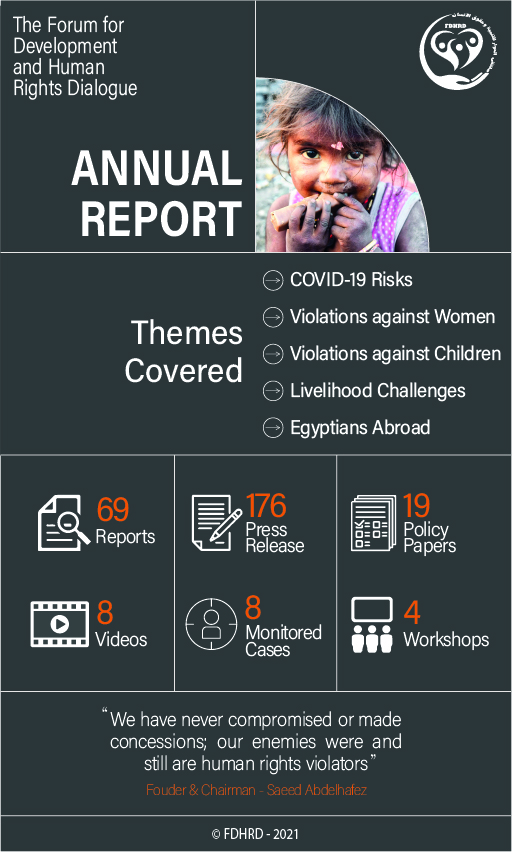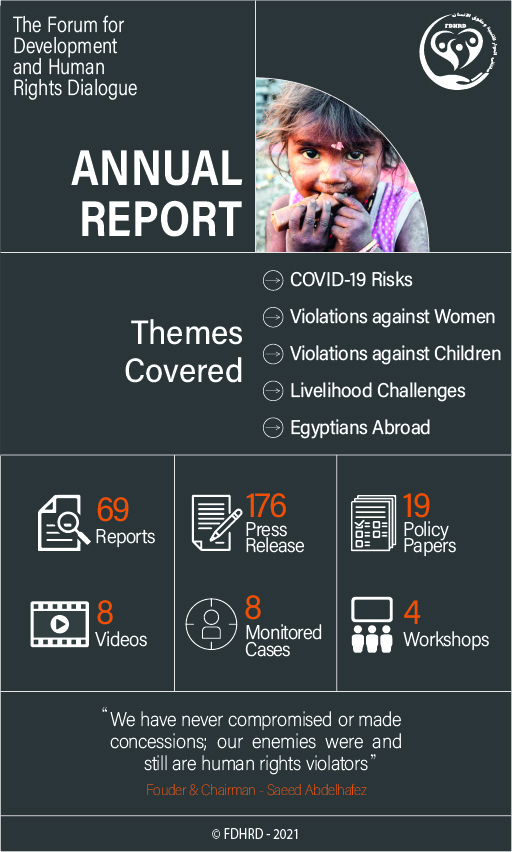Press Release
…………………………………………………………..
Today, Monday, January 17, 2022, the Forum for Development and Human Rights (FDHRD) issued its annual report for the year 2021 to present the most important achievements, activities and reports carried out by the organization despite the repercussions of the Covid-19 health pandemic and its economic repercussions in weaking the opportunities of upgrading the activity of civil work.
The report presented the production figures and the activities carried out by the FDHRD during the year. They were: 176 press releases, 69 reports, 19 documentary videos, and 8 policy papers. In addition to four workshops specialized in human rights and human trafficking in the governorates of Cairo, Alexandria, Beheira and AlMinya, despite the pandemic conditions. You can learn about this by visiting the organization’s website: https://www.fdhrd.org/en/
The report indicated that the FDHRD’s most prominent event was becoming a member of the Global Learning Community (GLC) to Combat Human Trafficking and the Global Alliance Against Trafficking in Women (GAATW). The two organizations are among the most prominent cross-border NGOs working in the field of combating and counteracting human trafficking.
The annual report dealt with topics that were carried out by researchers of the Unit of Studies and Researches at the FDHRD throughout the year. The topics are divided into five themes: (Covid-19 risks, violations against women, violations against children, livelihood challenges, and Egyptians abroad).
The Corona pandemic has left negative economic and social effects on all countries of the world, led by rich countries such as Britain, France, Italy and Spain, where livelihoods have deteriorated, job opportunities have decreased and family savings have deteriorated.
One of the repercussions of the pandemic is that racism, discrimination and stigma appeared on some countries, such as China, Brazil, India, or individuals who are citizens of those countries, or those who contract the virus in general. People in poor countries were also affected by the inequity in distributing vaccines. The competition between pharmaceutical companies hindered the access of developing and poor countries to high rates of vaccines to protect their people.
Another negative phenomenon that further worsened the human condition is modern slavery. Irregular employment, especially immigrants and daily wage workers, is the most vulnerable group to modern slavery and the Covid-19 infection.
With the spread of the Corona pandemic, many women lost their jobs and were forced to stay at home. This exposed them to domestic violence, whose rates increased fivefold during the outbreak of the pandemic. So, many called it “the shadow of the pandemic.” The report touched on women’s violations in several countries, including Egypt, Turkey, the African Sahel countries, and Afghanistan. It addressed the issue of violence during childbirth in armed conflicts in Yemen and with Syrian refugees in Turkey.
With regard to violations against children, the report dealt with violations against children in Palestine, Turkey, Ethiopia, Yemen and the countries of the African Sahel, and these countries spread images of political violence, wars and civil wars.
The report also focused on the livelihood challenges and the conditions of peoples in some countries, such as Niger, Ethiopia, and Egypt. It touched on climate change and its repercussions on livelihood, and the problem of water shortage in the Arab world.
With regard to the Egyptians abroad, the report dealt legal and illegal immigration in Egypt and its causes, and the efforts of the Egyptian state to address the phenomenon of illegal immigration.
Saeed AbdelHafez, founder and CEO of the FDHRD, stated, “Several years have passed, we have taken a step and taken steps back. We have witnessed milestone events in the history of our country, including political, economic and social changes that marked the lives of Egyptians. We hope that we will not abandon our legal and objective methodology. Our goal remains the citizen.” Egyptian.”
Abdelhafez adds “we have not compromised or tolerated, because our rivalry was and still is with the violators of human rights.”








